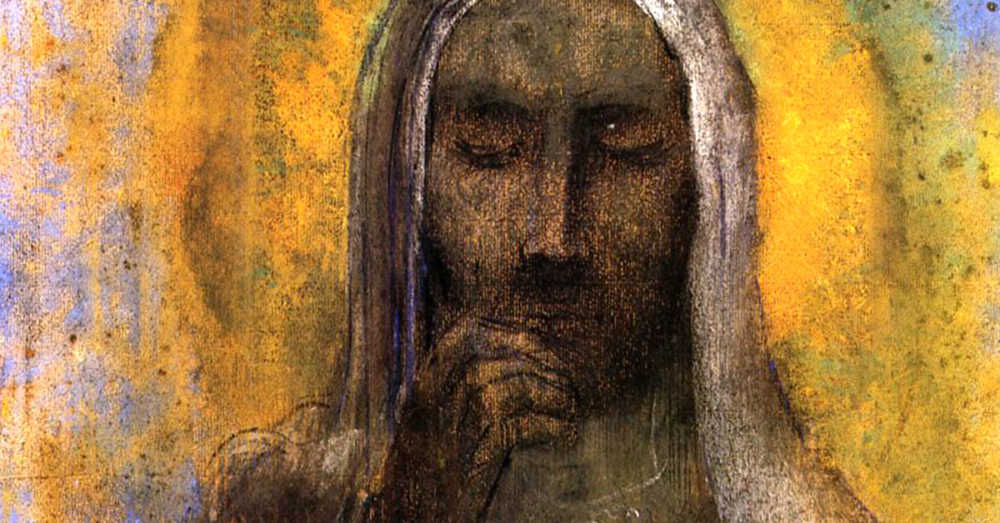We run our website the way we wished the whole internet worked: we provide high quality original content with no ads. We are funded solely by your direct support. Please consider supporting this project.

God’s Dream for the World
The future doesn’t yet exist—which is why it’s future instead of the present or past—this doesn’t mean I’m claiming the future is wide open. To the contrary, it’s very clear from Scripture that God has a great plan for the future, and this plan steers the course of history by setting limits on what can and can’t occur and influencing what comes to pass. God created the world and is now moving it to the fulfillment of a glorious dream.
We see God’s glorious dream expressed in Jesus’ prayer in John 17, which is the most outstanding prayer ever recorded, if you ask me. Jesus prays to the Father on behalf of all who will come to know him (which he hopes will be the whole world) (vss. 20, 23). He further prays to the Father that his followers may be “one…just as you are in me and I am in you” (vs. 21, emphasis added). He then proclaims that he has given us the same “glory” that was given him before the foundation of the world (vs. 22, 24), and he did this so that we may be one, just as he and the Father are one. “I in them and you in me,” he continues, “so that they may be brought to complete unity.”
Clearly, the “glory” Jesus refers to is the glorious loving unity of the triune God. And when his disciples reflect this glory, Jesus says to his heavenly Father, “the world will know that you sent me and have loved them even as you have loved me” (vs. 23, emphasis added). Jesus ends his prayer by telling the Father he will continue to make him known so that “the love you have for me may be in them and that I myself may be in them” (vs. 26).
What a dream! God’s vision for humanity is nothing less than for us to be participants in the perfect love that he is throughout eternity. He wants the love of the Trinity to be the replicated toward us, among us and through us to the whole world. God’s dream is for us to be in him, and he to be in us—in the same way the Father is in the Son and the Son is in the Father. The dream is for humanity to be loved by God, and to in turn love God, with one and the same love that is the eternal triune God.
I’m convinced this is what the Bible means when it says God makes us participants of the divine nature (1 Pet 1:4), for the divine nature is love (1 Jn 4:4). I’m also convinced this is why Paul repeatedly says that believers are placed “in Christ.” We don’t simply relate to God through Christ. We relate to God in Christ. We share in the Father’s relationship to the Son and the Son’s relationship to the Father. When we are saved, you might say, we are pulled into God and are eternally allowed to share in the ecstatic love that he eternally is.
I believe Paul is making the same basic point when he says that all things were created by Christ and for Christ. Christ was always intended to be the head of humanity, his “body,” and the means by which God united the cosmos together (Col. 1:15 -20). This is also why Paul taught that the grace that saves us was “given us in Christ Jesus before the beginning of time” (2 Tim. 1.9) and why Jesus said that the glory he gives to us was given him “before the foundation of the world” (Jn 17:24).
art: “Christ in Silence”
by: Odilon Redon
date: c.1897
Category: General
Tags: Jesus, Love, Trinity, Triune Love, Unity
Topics: Following Jesus
Related Reading

The “Christus Victor” View of the Atonement
God accomplished many things by having his Son become incarnate and die on Calvary. Through Christ God revealed the definitive truth about himself (Rom 5:8, cf. Jn 14:7-10); reconciled all things, including humans, to himself (2 Cor 5:18-19; Col 1:20-22), forgave us our sins (Ac 13:38; Eph 1:7); healed us from our sin-diseased nature (1…

Do the Gospels Promote Anti-Semitism?
Over the last couple of weeks we have been looking at various passages from the Gospels that have been used by some to argue that Jesus condones violence. Here is a link to each of them: The Cleansing of the Temple and Non-Violence Was Jesus Unloving Toward the Pharisees? Violent Parables? Why Did Jesus Curse…

Loving a Twilight Zone God?
David D. Flowers posted this insightful reflection over on his blog about an episode of The Twilight Zone and what it says about some pop views of God. Can we really love a God that exercises this kind of random control just because he can? We can certainly fear a God like this, but can…

Podcast: Could Jesus Have Sinned? (part one)
Greg considers the nature of temptation and the temptability of God. http://traffic.libsyn.com/askgregboyd/Episode_0114.mp3

Xmas
Kevin Dooley via Compfight Zach Hunt brings a huge challenge in this article about the ongoing lament about the “liberal attack on Christmas.” Maybe the real problem is not with the media or the “liberals” or the merchants, but with us. There’s an opportunity here for us to remember who we really are and what…

Podcast: What Does it Mean for Jesus to Mediate for God if Jesus IS God?
Greg discusses what it means for each member of the Trinity to have different roles. http://traffic.libsyn.com/askgregboyd/Episode_0159.mp3
